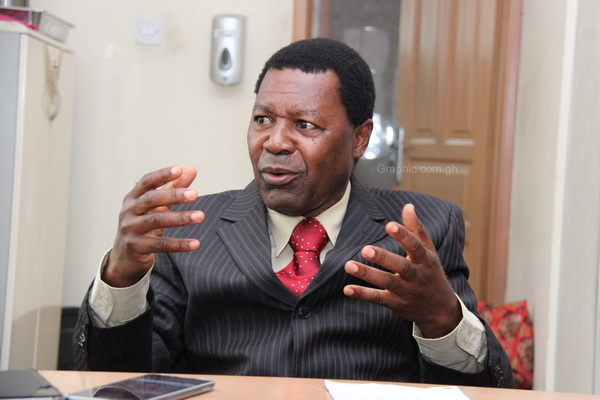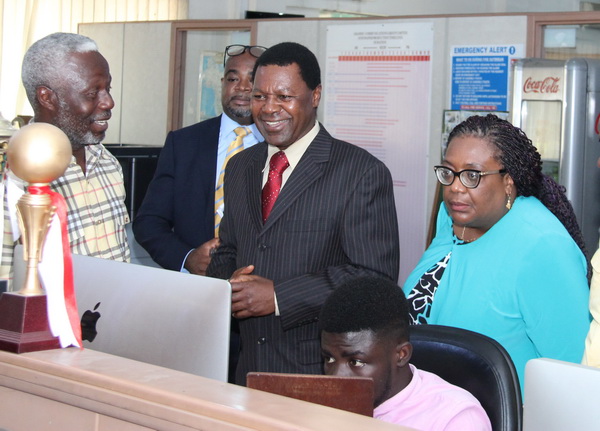
Review NHIS financing module to prevent collapse — Dr Annor
The Chief Executive Officer (CEO) of the National Health Insurance Authority (NHIA), Dr Samuel Annor, has underscored the need for the country to take a serious look at the financing module of the National Health Insurance Scheme (NHIS) to prevent it from collapse.
“We have been broke for many years now because of the financing module,” he declared.
Advertisement
Dr Annor made the disclosure in an exclusive interview with the Daily Graphic after the top management of the authority had paid a visit to the paper and taken part in the newspaper’s editorial conference yesterday.
The CEO was accompanied by the Deputy CEO in charge of Operations, Dr Lydia Dsane Selby; the Deputy CEO in charge of Administration and Human Resource, Mrs Yaa Pokuaa Baiden; the Deputy CEO in charge of Finance, Mr Francis Owusu, and the Director of Membership and Regional Operations, Mr Ben Kusi.
The rest were the Deputy Director of Marketing, Mr Oswald Esuah-Mensah; the Deputy Director at the CEO’s Secretariat, Mr Davis Opoku Ansah, and the Communications Manager, Richard Barima Sarpong.
A mismatch of figures and funds
Throwing more light on how the scheme found itself in the current financial state, Dr Annor explained that about seven million people were registered on the scheme in 2009 and it started piling debts from about 2010 as a result to an increase in the number of persons registered to about 11.5 million but without a corresponding increase in the funds available.
Therefore, he explained, with the growing numbers and dwindling resources, it became difficult to make payments, a situation which, according to him, culminated in the loss of interest in the scheme by the generality of Ghanaians.
“But, thankfully, we are bouncing back and we need the support of all Ghanaians, civil society and the media to succeed,” he said.
Dr Annor also appealed to the government to implement recommendations made by the authority towards renewing the financial module to raise adequate funding for the sustainable running of the scheme.

Financial module
With the mid-year review budget to be presented by the Finance Minister next Thursday, Dr Annor said that the authority was hoping that the government would increase the National Health Insurance Levy (NHIL) from the current 2.5 per cent to 3.5 per cent, impose a health tax on tobacco, alcohol and sugar, as well as make a one per cent deduction from employees’ salaries to be matched by same from employers.
Additionally, it was requesting one per cent of the Ghana Infrastructure Fund into the National Health Insurance Fund (NHIF) and 20 per cent of the Communications Tax.
Dr Annor appealed to the public to cultivate interest in the business of the authority and assured them that its current leadership ran an open-door policy and would welcome all who were desirous of knowing the inner workings of the NHIA.
The focus, he explained, was to engender trust, transparency and understanding with the people of Ghana for them to be re-assured that every money that was placed in the care of the authority would be protected and used judiciously for the benefit of all Ghanaians.
To that end, he said, measures had been instituted aimed at arresting the theft of the authority’s funds, adding that an extremely punitive regime had been put in place to deal harshly with anyone who would be caught stealing.
Stringent measures
Expatiating on the new measures, Dr Annor said the management of the NHIA was re-structuring the NHIS on four pillars, including fully implementing electronic claims management to improve efficiency and reduce fraud.
He said the NHIA was also working to improve compliance (clinical and internal audits) to mitigate fraud and amend the NHIS Law to make crime against the scheme more punitive and a deterrent to potential fraudsters.
Stakeholder support
Dr Annor stressed that the reason the scheme was in its current financial state was that its financial model was not effective.
He said following the revision of the scheme, it had become apparent that the government alone could not handle the burden of providing all the required resources for health management and that required that other stakeholders provide support to augment the efforts of the government.



